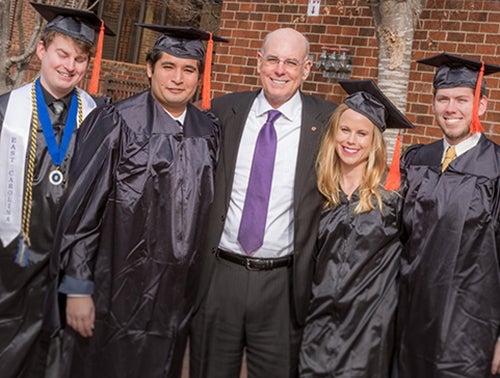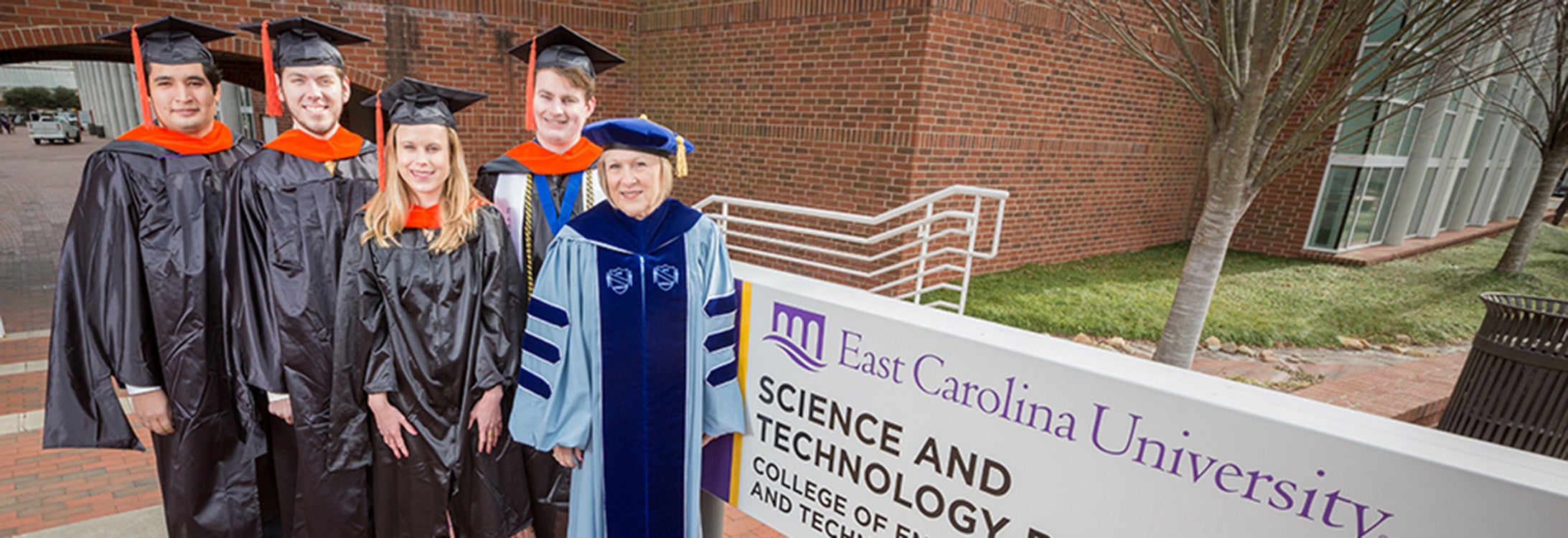DYNAMIC FUTURES
First class of ECU biomedical engineering masters celebrates degrees
For the fall 2016 graduation ceremonies, East Carolina University’s College of Engineering and Technology lived up to the university’s promise: Tomorrow starts here.
For the college, “tomorrow” is represented by the new Master of Science in Biomedical Engineering (BME) program, and it all started with Matthew Cadmus, Bryce Cranwell, Danny Vargas and Elizabeth “Blair” Meriwether Weaver. They are the first graduate students to earn degrees from the Department of Engineering, making history as they received their diplomas on Dec. 16.

Dr. David White, dean of the College of Engineering and Technology, celebrates with the college’s first Master of Science in Biomedical Engineering graduates
Dr. David White, dean of the college, said that he’s excited for any graduate of the college’s programs, but these four are different.
“This is the first group of graduates of what I hope is a dynamic and innovative degree program,” he said.
Biomedical engineering works to improve medical systems by applying engineering sciences, analysis and design to human health performance and medicine. As part of the M.S. in BME program, students are engaged in multidisciplinary research and the application of innovative, advanced technologies that solve complex problems in the health care industry.
Dr. Barbara Muller-Borer, an associate professor and graduate program director for the M.S. in BME program, said graduates will have a variety of career choices ahead of them; from tissue and neural engineering to prosthetics and imaging, biomedical engineering will lead advancements in numerous health-related fields.
Muller-Borer believes the ability to work with ECU’s Health Sciences programs – the Brody School of Medicine, College of Nursing, College of Allied Health Sciences and the School of Dental Medicine – is a major factor in preparing these grads for fruitful careers. However, according to Muller-Borer, so is access to all of the college’s engineering programs.
“Each M.S. student is required to complete a thesis project and include one faculty advisor from outside the department,” said Muller-Borer. “Working on multidisciplinary teams, these four graduates were provided the opportunity to apply engineering principles to advance medical discovery and health care,” she added.
The four graduate students agree with Muller-Borer, and they are aligned when it comes to the importance their thesis advisors played in obtaining their degrees.
‘The Fantastic Four’
The UNC Board of Governors approved the M.S. in BME program in 2014, and the program’s first classes started in August of that year.
Vargas missed that start because he was becoming a U.S. citizen. Originally from Peru, Vargas received his undergraduate degree from James Madison University in Virginia.
Cadmus is from outside of Charlotte and received his undergraduate degree from ECU, as did Holly Springs-native Cranwell. Weaver is a Greenville native but came to ECU after earning her undergraduate degree at Vanderbilt.
As their classes continued, there were discussions on what they should call themselves. The Fantastic Four was mentioned a number of times, but it didn’t stick. However, they thought there was another Fantastic Four that was deserving of that name: their thesis advisors.
Dr. Muller-Borer served as Vargas’ advisor, and Dr. Jason Yao advised on Weaver’s thesis that looked at an innovative approach to help monitor congestive heart failure patients at home.
Assistant Professor Dr. Sunghan Kim was Cadmus’ thesis advisor. Regarding Kim’s influence, Cadmus said, “I owe (Kim) a tremendous debt of gratitude. His guidance and kindness led me to the success I experienced at ECU.”
Cranwell said his advisor, Dr. Ricky Castles, “had an immeasurable impact on my Masters’ journey. He was more than a mentor – he was also a good friend.”
White, who oversaw the creation of the new M.S. in BME program, sees a bright future for the four graduates and the program.
“If you come to ECU, you’re going to have some tremendous opportunities to do some great things,” said White. “This program is just one example of the many opportunities our students have to accomplish things that can change the world.”
